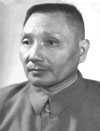Special biographic research
Wen Wei Publishing Company, Ltd. 2002-2006
Who's Who, Current Chinese Leaders
Wen Wei Publishing Company, Ltd. 2003-2005
Biography Revised: 2/25/2009
Career Data Updated: 2/25/2009
Biography
Deng Xiaoping, Han nationality (Hakka), was born Deng Xixian in 1904 in Guang'an county, Sichuan province. He went to France in 1920, where he worked, studied, discovered Marxism-Leninism, and joined the CPC in 1924. Deng spent part of 1926 studying at the Sun Yat-sen University in Moscow, before returning to China in 1927.
Deng then joined the Red Army during the first civil war against the Guomindang. During the Long March in 1934, he served as General Secretary of the CPC Central Committee. In the late 1930s and 1940s, Deng continued his political work in the Red Army during the War of Resistance against Japan and the second civil war against the Guomindang.
Deng was named to several important posts in the new People's Republic after 1949. In 1957, Deng became CPC General Secretary and ran the country's daily affairs with then President Liu Shaoqi. Amid growing disenchantment with Mao's Great Leap Forward, Deng and Liu gained influence within the CPC when, in the early 1960s, they directed successful economic reforms.
When Mao launched the Cultural Revolution in 1966, Deng was purged and sent to work in the countryside. Premier Zhou Enlai was able to convince Mao to bring Deng Xiaoping back into politics in 1974 as First Deputy Premier, in practice running daily affairs. But after Zhou's death in January 1976, Maoists purged Deng once again.
Following Mao's death later in 1976, Deng was able to outmaneuver Mao's anointed successor, Hua Guofeng, and consolidate his control of the CPC in the late 1970s. Hua was replaced by Zhao Ziyang as premier in 1980, and by Hu Yaobang as CPC chief in 1981. After 1987 Deng's only official posts were as chairman of the PRC and CPC Central Military Commissions; he exercised his power behind the scenes.
Even while consolidating his political power, Deng initiated a "reform and opening" policy that sparked an industrial revolution in China. Deng decentralized economic decision making, embraced the "socialist market economy," and sought the "Four Modernizations" of agriculture, industry, science and technology, and the military. These reforms were a reversal of the Maoist policy of economic self-reliance, but they accelerated the modernization process through "opening" to foreign trade and investment. Special Economic Zones were established where foreign investment and market liberalization were encouraged.
In 1989, Deng ordered the crackdown on the Beijing Spring protestors, precipitating the Tiananmen Square crisis of June 4, 1989. In the spring of 1992, Deng went on his "southern tour" to Canton and Shenzhen, reviving economic reforms that had been stalled since 1989.
Deng Xiaoping died on February 19, 1997.
